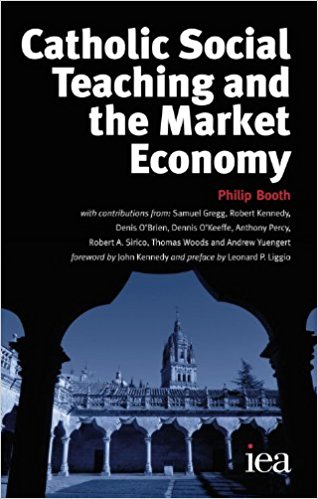Catholic Social Teaching and the Market Economy
 Anyone who is interested in an overview of Catholic social teaching and the economic policies that are in harmony with it should read this book. It is published by the Institute of Economic Affairs and is available from Amazon or as a free download from the IEA website here - I read it on kindle on my phone from this. If you order a hard copy be sure to get the second edition which is much fuller presentation. The contributors to this book clearly explain, in terms that people without prior knowledge could understand, the main ideas behind Catholic social teaching and consider how they might be realised practically. This is rooted in sound doctrine, and sound economics. This cannot be emphasized enough - so often discussions and public statements of what ought to be in society, even by member of the hierarchy of the Church, seems to be lacks.
Anyone who is interested in an overview of Catholic social teaching and the economic policies that are in harmony with it should read this book. It is published by the Institute of Economic Affairs and is available from Amazon or as a free download from the IEA website here - I read it on kindle on my phone from this. If you order a hard copy be sure to get the second edition which is much fuller presentation. The contributors to this book clearly explain, in terms that people without prior knowledge could understand, the main ideas behind Catholic social teaching and consider how they might be realised practically. This is rooted in sound doctrine, and sound economics. This cannot be emphasized enough - so often discussions and public statements of what ought to be in society, even by member of the hierarchy of the Church, seems to be lacks.
The constributors to this book, which is edited by Philip Booth of the Institute of Economic Affairs, explain ideas such as solidarity, subsidiarity and the common good and in the light of these consider how they offer the chance for a society that will give greatest human flourishing. They show how a free society and in accord with this, a free economy, are necessary for such flourishing and how they support natural associations of people which are in harmony with this goal, such as the family.
They explain also why socialism - even the soft socialism of Western European democracies - is bound to undermine them.
This second edition, which takes into account of recent developments in both political economy such as the crash of 2008, examines how differing approaches to taxation, welfare, foreign aid, labour markets, finance and the environment often result in the opposite effect of that sought. If ever we need evidence that passing a law that attempts to enforces a desired economic result usually backfires, we have it here.
It is common for critics of the free market to claim that its proponents have a diminished sense of the human person, of freedom and ignore the importance of culture of beauty and responsibility. These are not accusations that can be levelled at the writers of this book.
Most of those who contributed to this book are connected also to the Acton Institute. This year's annual conference - the Acton University - which took place in June was once again a wonderful and inspiring event. This organization is not just a think tank, it is an 'acton tank' too! In other words it is interested in both practical and intellectual. I heard descriptions of projects in which these principles are put into practice to good effect. There were real answers, borne out by experience, to inner city deprivation (I heard speakers from Detroit and Dallas) to the developing world - the Poverty Cure videos are produced by Acton; to environmental problems.